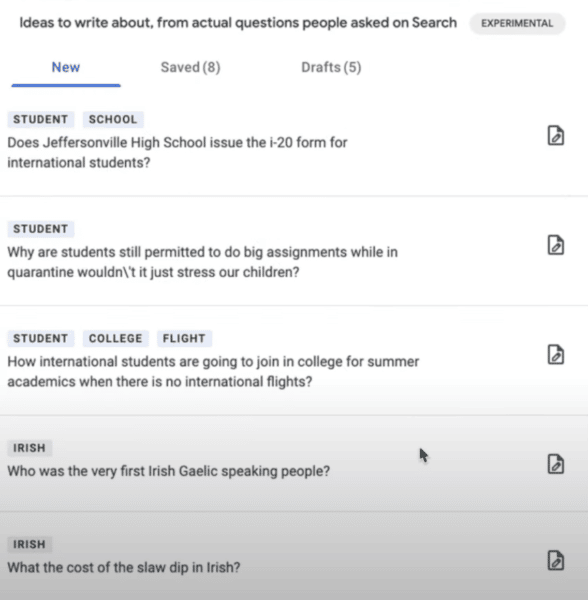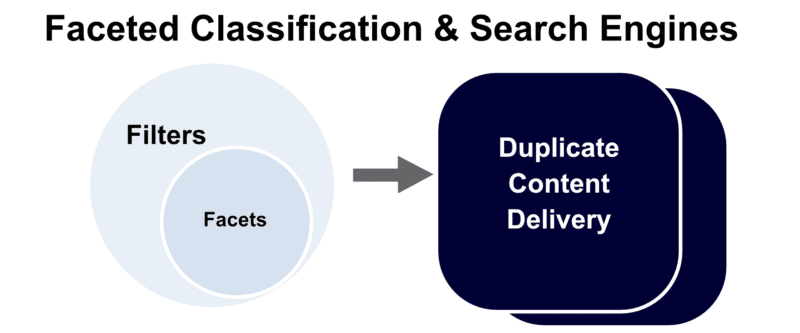Google Site Kit gains ideas to write about section
Google Site Kit, a tool Google makes for WordPress sites to display Search Console, Analytics PageSpeed Insights, and AdSense data, has a new experimental feature that seems to pull from Google Question Hub.
This was announced in a video by Google’s Mariya Moeva, at the 8:56 mark into that video. Mariya shares a screenshot of an “experimental” section that says “ideas to write about, from actual questions people ask on Search.”
The screenshot. Here is the screenshot in that video:

You may not have used Google Question Hub yet and if not, you are really missing out on a great set of content ideas for your site. But now, if you do use Site Kit with your WordPress site, Question Hub data seems to now be built directly into the tool.
So leverage the content in that section to come up with new content ideas for your site.
Source: Google Site Kit gains ideas to write about section
Google Search Console notices for removing intrusive interstitials
Google seems to be sending out notices through Google Search Console for sites that have intrusive interstitials. The notice tells the site owner to remove those intrusive interstitials in order to “improve page experience” for your site.
What the email says. We spotted a copy of the subject line of the email in the Google Webmaster Help forums and it reads “Improve your page experience by removing intrusive interstitials from domain.com.” We have been unable to find the full email or a screenshot of this notice yet.
Here’s a screenshot of one of the messages (shared by Casey Markee on Twitter):

What are intrusive interstitials? Google says “intrusive interstitials and dialogs are page elements that obstruct users’ view of the content, usually for promotional purposes. Interstitials are overlaid on the whole page and dialogs are overlaid only on a part of the page, sometimes also obfuscating the underlying content. Websites often need to show dialogs for various reasons; however, interrupting users with intrusive interstitials may frustrate them and erode their trust in your website. Intrusive dialogs and interstitials make it hard for Google and other search engines to understand your content, which may lead to poor search performance. Equally, if users find your site hard to use, they are unlikely to want to visit those websites again, including through search engines.”
Source: Google Search Console notices for removing intrusive interstitials
How to handle unprofessional SEO treatment: tips and guidelines
I am what might be called a veteran search engine optimizer. I have many years of experience speaking at multiple SEO events (conferences, webinars, training, and so forth). I often get involved in controversial SEO debates on various social media outlets.
I have also had my share of bullying.
However, I have also learned much from other SEO veterans. They have been outstanding role models for people in our industry.
In this article, I want to share what I’ve learned from participating in so many SEO events and my experience on social media platforms. Here is what I have learned about handling unprofessional treatment.
1. Listen to multiple perspectives on any SEO or SEM topic
I know this might seem counterintuitive. If you are in a real-time situation, it is perfectly normal to have an initial defensive reaction.
Go past this reaction. If you listen, you will likely learn things you might never have thought about or encountered. Listening to and reading about different approaches to SEO can make you a more effective SEO.
I learned this from Danny Sullivan, now Public Liaison for Search at Google. Whenever he put together a session for one of his conferences, he always included a panel of experts with diverse opinions.
2. Be courteous when taking notes
If you are at a real-time or recorded event, learn how to mute your keyboard, even if you have a quiet keyboard. The sound will distract attendees from speaker content, especially if multiple attendees are typing at the same time. Mouse clicks can also be a distraction.
This tip might seem obvious given high school, college, and university settings. With professional events, however, the point is to listen to the speaker, not to distract him or her.

3. Show common courtesy when asking for clarification and challenging an opinion
Nobody has the exact same frame of reference as another person. For example, my frame of reference for SEO is viewing it as a form of communication among content providers, searchers, and search engines. I believe that SEO is optimizing for people who use search engines. People first, technology second.
Source: How to handle unprofessional SEO treatment: tips and guidelines
3 powerful micro-conversion strategies for paid social
Conversions are the key KPI when defining the success of direct response campaigns for both B2B and B2C.
These days, conversions are so top priority that many companies don’t even spend money on brand awareness campaigns in their paid social strategies.
When marketers get way into the weeds with conversions, they often forget about the benefits, and long-term impact, of micro-conversions.
Optimize top-of-funnel campaigns for website engagements rather than clicks
Decrease your cost-per-landing page view by optimizing for website engagements. Website engagements signal higher intent compared to link clicks. Optimizing toward users who are likely to take action on your website ultimately brings in better quality users with a higher chance of converting than those who just click. To illustrate this strategy, let’s focus on Facebook.
Build High-Intent Retargeting Audiences
Decrease your cost-per-lead by building high-intent retargeting audiences. You can create audiences based on specific micro-conversion actions to improve bottom-funnel conversion metrics. Instead of retargeting based on just website traffic, try retargeting based on a user’s time on specific landing pages.
Capture missed leads
Increase conversion rates by capturing missed leads. Using micro-conversions, you can track users who opened a lead gen form ad or began to fill out a form on your website. We can then take them back a step and offer more resources and brand education to help them convert at the bottom of the funnel.
To illustrate this strategy, we’ll focus on LinkedIn and Facebook.
Source: 3 powerful micro-conversion strategies for paid social
More news:
WhatsApp is bringing polls to group chats: Here’s how it will work
Pinterest for WooCommerce extension turns products into shoppable pins

